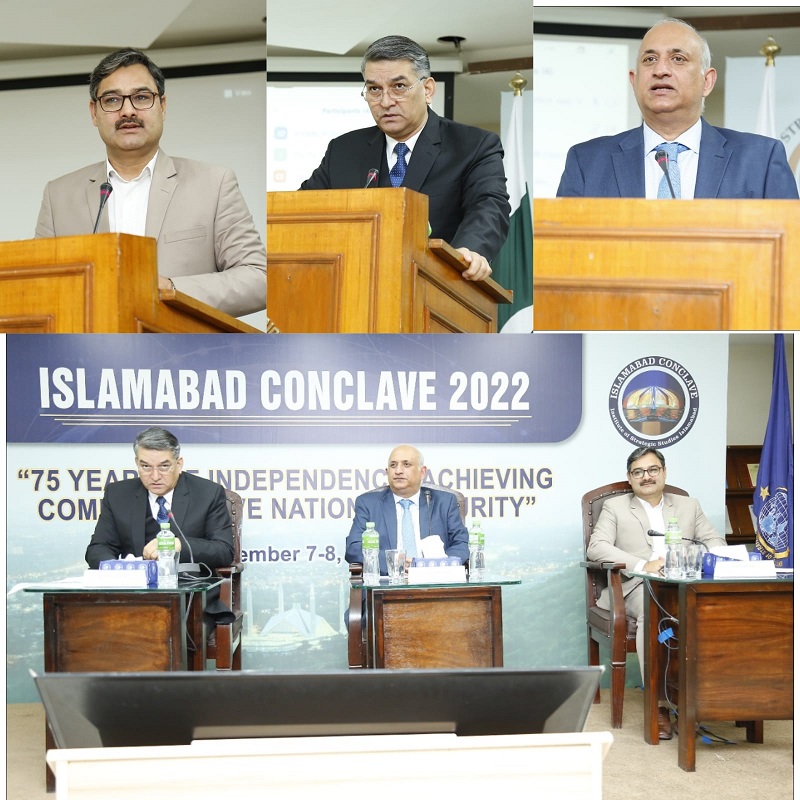Press Release
Islamabad Conclave-2022
Working Session-IV: “75 Years of Independence: Pursuit of Geo-economics”
December 8, 2022

The Institute of Strategic Studies, Islamabad (ISSI) held its flagship event the Islamabad Conclave-2022 on the Theme “75 Years of Independence: Achieving Comprehensive National Security.” On the second day of the event, on December 08, 2022, the China-Pakistan Study Centre (CPSC) hosted Session-IV themed “75 Years of Independence: Pursuit of Geo-economics.”
Haroon Sharif, former Chairman Board of Investment delivered keynote address. Afterwards, Professor Lin Minwang, Assistant Dean at Institute of International Studies Fudan University spoke on role of CPEC in Pakistan’s economic development. Next speaker, Dr. Adam Saud, Head of Department Humanities and Social Sciences at Bahria University, spoke on the topic of connectivity with Central Asia. Third panelist was Dr. Fayyaz ul Hasan, on the subject of Ensuring Food Security and Modernising Agriculture. Dr. Talat Shabbir, Director CPSC, moderated the session.
Mr. Haroon Sharif, in his keynote address, underscored that the world at large is in transition from globalization to deglobalization. This has led states to focus more on geo-economics. Due to this deglobalization, the cost of doing business has increased. Countries must reach out their neighbours and focus on leveraging comparative advantages. In Pakistan’s case, it is China, the prominent neighbour when it comes to trade, connectivity and good economic relations. Mr. Sharif said that traditionally, Pakistan has looked at economic problems through the geo-strategic lens. That is not a sustainable proposition. It reduced our capability to develop actual economic opportunities. Geo-strategically important Pakistan has missed opportunities. Behind these missed opportunities, the reason is multiple conflicts going in the region. Highlighting these issues, Mr. Sharif recommended that the leadership must change the mindset. The country must reach out to the new world. In different countries, governments have merged Foreign Offices with the Ministry of Commerce, as both have essentially, the same end goal. Pakistan can also follow these models. Moreover, Pakistan must develop some transaction products to sell to the world. Currently, the world is facing food and energy scarcity. Pakistan can cash this opportunity by exporting food to the neighbourly region especially to the Middle East. Besides, to avoid Red Tapism, the system must be deregulated and private sector must be given enough room to find opportunities around the world.
Professor Lin Minwang highlighted the significance of CPEC in China-Pakistan relations. He said that geo-economics is the base of China-Pakistan relations. Pakistan hitherto was engaged actively in the regional politics. China has always been an incredible and reliable friend of Pakistan. The country must build environment of opportunities provided by CPEC.
Dr. Adam Saud highlighted Pakistan’s relations with Central Asian region. He underlined that Pakistan’s relations with Central Asia dates back to history, long before their independence. The downturn in the bilateral relations came when Taliban took the power in Afghanistan back in 1990s. However, relations have started improving and after 2018 bilateral trade has sufficiently increased between Pakistan and Central Asian states. There is huge potential that can be cashed only by the leadership’s prudence. Dr. Saud recommended that Pakistan must empower its private sectors and enhance official level summits to realise the true potential of Pakistan-Central Asia relations.
At the end of the working Session-IV, Ambassador Khalid Mahmood, Chairman BoG ISSI presented ISSI Mementos to the esteemed speaker.












